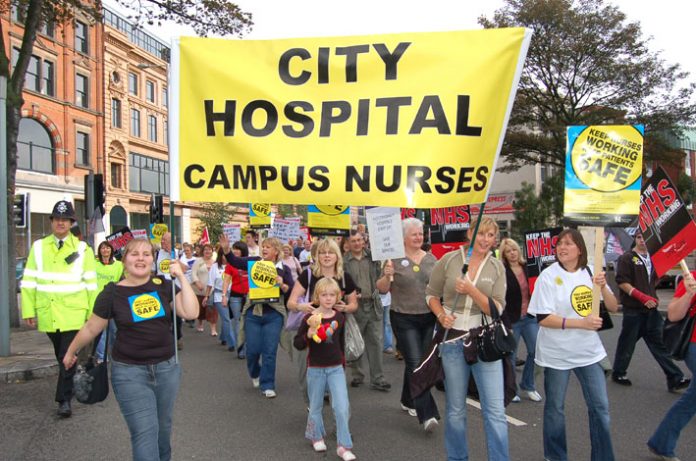The Labour government has decided to put on hold a decision to scrap the ‘double whammy’ NHS accounting rules that are forcing hospital trusts into a cycle of spiralling deficits.
This is despite warnings and appeals from the trade unions and trust chiefs that the system is promoting painful cuts.
Under Resource Accounting and Budgeting (RAB), trusts suffer a ‘double whammy’ of having to make good their current deficit, while having the same deficit subtracted from the next financial year’s budget.
It has been calculated that one trust in Woolwich could see a £9m deficit turned into a £99m deficit in five years.
NHS Chief Executive David Nicholson has admitted: ‘The way in which RAB is applied to NHS trusts, although providing a strong disincentive to overspend, will become increasingly unsustainable as we move forward with the programme of reform.’
Nicholson accepted the logic of recommendations from the Audit Commission to exempt trusts from the regime, but said the Department of Health could not afford the £600m needed to pay off the RAB generated debts.
Gill Morgan, chief executive of the NHS Confederation, which represents the trust boards, said: ‘We are very disappointed the department has not taken the opportunity to revise the NHS accounting rules.’
Dr Jonathan Fielden, chairman of the British Medical Association (BMA) consultants’ committee, said it is ‘extremely disappointing’ to see that the NHS accounting rules remain intact.
He added: ‘This artificial accounting measure has imperilled many NHS trusts unnecessarily and forces short term cuts directly impacting on patient care.’
General Secretary of the RCN, Dr Beverly Malone, said that ‘we’re also disappointed’, adding: ‘Hard pressed trusts struggling to tackle deficits need more time and greater support, not unrealistic accounting deadlines and unachievable financial targets.’
Karen Jennings, UNISON Head of Health, said that the government’s ‘reform agenda’ and long-term debt is to blame for the deficits.
She added: ‘Deducting from the following year’s budget the amount the Trust is in debt is not a recipe for success.’
The Royal College of Midwives (RCM) Head of Employment Relations George Georgiou told News Line: ‘The system doesn’t work because it doubly penalises people.
‘What’s needed is a planned reduction of deficits, not just to lop off ten per cent off the top of the budget.’
He also condemned the fact that up to 43 maternity units faced closure or plans for closure.
Georgiou added: ‘We’re opposed to the closures. The government should invest more into maternity services to fulfil its promise of 2005.’
• A House of Commons Health Select Committee report out today says that tackling NHS deficits in England by slashing the amount spent on training NHS staff is ‘unacceptable’.
Responding to the report, James Johnson, Chairman of Council at the BMA, said: ‘Too many health authorities are raiding training budgets as a quick fix to their financial problems.
‘As a result, junior doctors are being prevented from taking essential courses in subjects like advanced life-saving, and vital academic posts in medical schools are at risk.’
Warning of ‘real consequences for patient care’ Johnson added: ‘The government must restore the protection to NHS training budgets that existed previously.’
